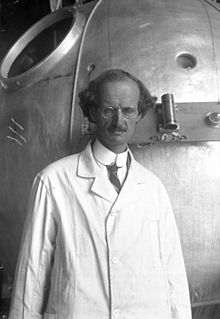Auguste Piccard
| Auguste Piccard | |
|---|---|

Auguste Piccard in 1932
|
|
| Born | Auguste Antoine Piccard 28 January 1884 Basel, Switzerland |
| Died | 24 March 1962 (aged 78) Lausanne, Switzerland |
| Nationality | Swiss |
| Fields | physics, inventor, explorer |
| Institutions | Free University of Brussels (now Université Libre de Bruxelles and Vrije Universiteit Brussel) |
| Alma mater | ETH Zurich |
Auguste Antoine Piccard (28 January 1884 – 24 March 1962) was a Swiss physicist, inventor and explorer, known for his record-breaking hot air balloon flights, with which he studied Earth's upper atmosphere and cosmic rays, and for his invention of the first bathyscaphe, FNRS-2, with which he made a number of unmanned dives in 1948 to explore the ocean's depths.
Piccard's twin brother Jean Felix Piccard is also a notable figure in the annals of science and exploration, as are a number of their relatives, including Jacques Piccard, Bertrand Piccard, Jeannette Piccard and Don Piccard.
Piccard and his twin brother Jean Felix Piccard were born in Basel, Switzerland on 28 January 1884.
Showing an intense interest in science as a child, he attended the Swiss Federal Institute of Technology (ETH) in Zurich, and became a professor of physics in Brussels at the Free University of Brussels in 1922, the same year his son Jacques Piccard was born. He was a member of the Solvay Congress of 1922, 1924, 1927, 1930 and 1933.
In 1930, an interest in ballooning, and a curiosity about the upper atmosphere led him to design a spherical, pressurized aluminum gondola that would allow ascent to great altitude without requiring a pressure suit. Supported by the Belgian Fonds National de la Recherche Scientifique (FNRS) Piccard constructed his gondola.
...
Wikipedia
